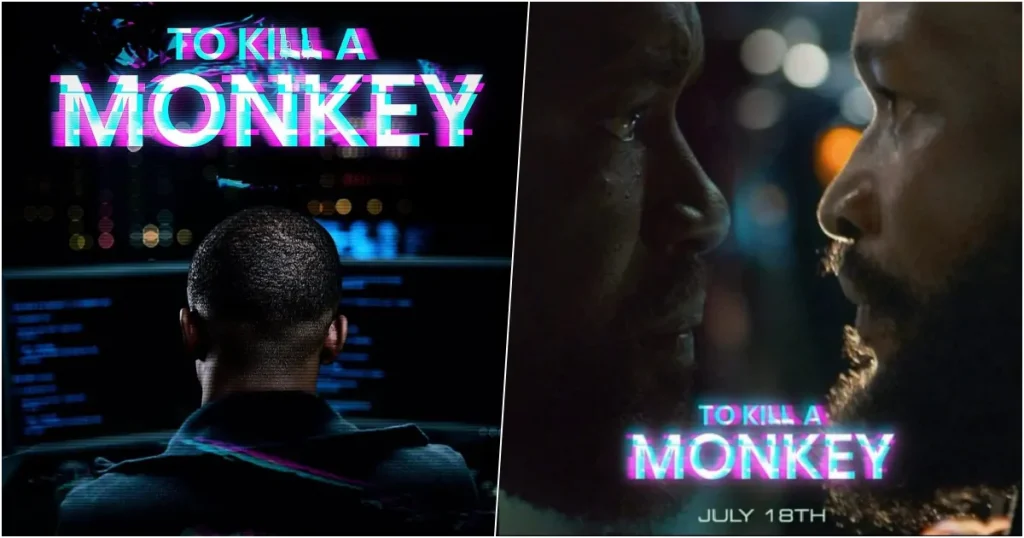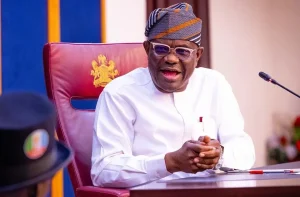
In To Kill a Monkey, Kemi Adetiba doesn’t just tell a story of cybercrime—she holds up a mirror to the quiet desperation wrapped in Lagos ambition. Beneath the surface of flashy scenes and ritualistic undertones lies a psychological war between becoming and pretending; between those born into power and those who must perform it to survive.
The brilliance of To Kill a Monkey is not in its plot twists, but in the questions it never asks aloud: What does it cost to wear success like a mask? Who gets to be wealthy without suspicion? Who must become a chameleon just to be accepted? It’s a layered narrative that studies the tension between identity and performance—especially for those like Efemini, who is neither completely poor nor entirely dangerous. He is simply desperate.
Adetiba uses the “monkey” scam as metaphor more than mechanic. It isn’t just about romance fraud; it’s about the entire system of hustle where survival demands illusion. In Lagos, even your truth must wear packaging. The monkey isn’t just the victim. It is the scammer too—forced to perform a version of themselves that society rewards. And in that dance of deceit, the lines between predator and prey blur disturbingly.
Visually, the series juxtaposes two Nigerias: the backstreet tenements humming with heat, sweat, and hunger, and the air-conditioned spaces where corruption wears cologne. You feel the temperature shift from scene to scene—not just in lighting, but in the characters’ posture. The most honest moments happen not in confession but in silence: a mother adjusting her son’s collar before a crime, a friend choosing betrayal with a smile.
Heroes In To Kill A Monkey
If there’s a hero in To Kill a Monkey, it’s not the inspector or the fraudster. It’s Lagos itself—restless, magnetic, chaotic, unforgiving. Every bus horn, every alley shadow, every rooftop ritual feels intentional. The city is not just a setting; it is the pressure cooker in which these characters either implode or transform.
But this is also a critique of class memory. To Kill a Monkey doesn’t scream corruption—it whispers what it means to want more when you were never meant to have it. It explores how people manufacture dignity when the system denies them legitimacy. The most painful betrayals in the story aren’t criminal; they are personal. Between brothers. Between friends. Between who you are and who you’re forced to become.
READ ALSO: Rent: How Yahoo Boys Are Driving Up Rental Cost in Abuja 1
The real weight of the series lies in its commentary on ambition. Not the flashy Instagram kind—but the hungry, throat-tightening, do-or-die ambition that pushes you to become a version of yourself even you won’t recognize. And in that, To Kill a Monkey strikes a deeply Nigerian nerve—one no heist or hacker code could ever touch.
Verdict from Fact Frontier NG:
To Kill a Monkey is not a crime thriller. It is a character study in disguise.
A portrait of hustle painted in fraud.
A Lagos prayer said backward
Rating: 8.5/10 – Introspective, atmospheric, and uncomfortably close to home.
About Kemi Adetiba
Kemi Adetiba, born 8 January 1980 is a Nigerian filmmaker, television director and music video director, whose works have appeared on Channel O, MTV Base, Sound City TV, BET and Netflix.
Adetiba started out professionally as a radio presenter with Rhythm 93.7 FM, where she became the voice behind two nationally syndicated hit shows Soul’d Out and Sunday at the Seaside. She started anonymously posting personal remixes online on various applications, such as Spotify and SoundCloud, under the username and tag ‘hule’.
She began to make a transition from being a voice on radio, to being a face on television by producing and presenting several shows on Mnet, which includs Studio 53, Temptation Nigeria, which she presented alongside Ikponmwosa Osakioduwa. Adetiba was also a presenter on Soundcity TV and hosted Maltina Dance All for three consecutive seasons.






